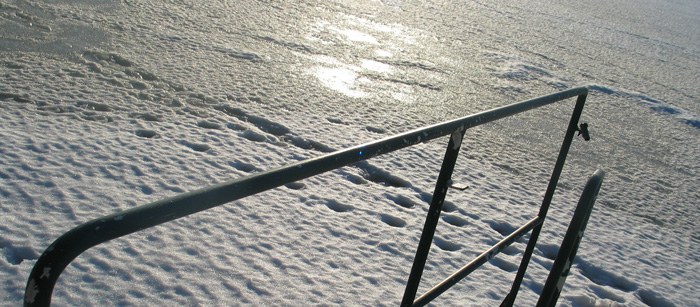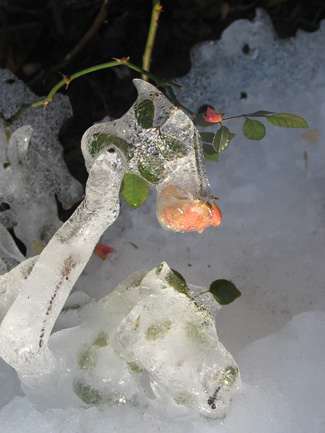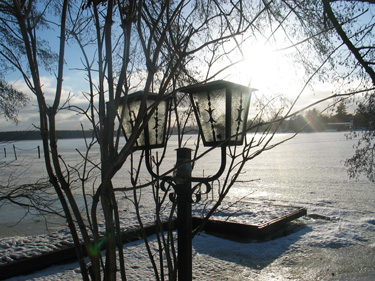What lies beneath: An ode to öde.
 Our seasonal neighbours, Herr and Frau G, arrive back in Schmöckwitz with the summer, carrying their expensive orange-eyed cat, all three of them looking smug. How can we possibly stand it here over the winter, they ask. It's so öde, so dead. They are in illustrious company with this view. Nineteenth century German novelist and poet Theodor Fontane visited the village during his Travels Through the March of Brandenburg (Wanderungen durch die Mark Brandenburg) and used exactly the same word to describe what he saw.
Our seasonal neighbours, Herr and Frau G, arrive back in Schmöckwitz with the summer, carrying their expensive orange-eyed cat, all three of them looking smug. How can we possibly stand it here over the winter, they ask. It's so öde, so dead. They are in illustrious company with this view. Nineteenth century German novelist and poet Theodor Fontane visited the village during his Travels Through the March of Brandenburg (Wanderungen durch die Mark Brandenburg) and used exactly the same word to describe what he saw.
I can see their point. It's ten past four and already dusk. Yesterday there was a partial eclipse of the sun, but nobody noticed. Around the village green the road is empty, the house fronts greyer than usual, except for a few last Christmas decorations hanging from a garden fence here and there. The lake is silent without the boats. The wind skims the frozen lake but nothing moves. There are no loose rowlocks to clink, no windsocks to play with and no masts to tug to and fro. I stood looking out at the lake this afternoon, trying to remember the summer, trying to remember how we lay in the water, staring up at the sky or rowed across the shipping lane, dogging barges in my rowing boat, Bootsy Collins, to get to the little sandy harbour on the edge of the woods. My cold reverie was broken by the neighbour two jetties down clanking up and down the ice of his garden path with a shovel. I tried to catch his eye, so I could smile and say something neighbourly, but he didn't look up from his task. People don't want to hang around in winter. The outdoors is something to be dealt with, and quickly.

First you shovel the snow and break up the ice, then you sweep the whole thing with a stiff brush, explains W, who lives in the third-floor flat next door. “There are rules in Germany,†he says solemnly. He is sweeping the last layer of snow and ice off the stretch of pavement in front of his building, as he does almost every morning, and I am trotting along beside him. Up and down we go until the cobbles are showing through. W is in his seventies and very old-school GDR. He spends much of his time by the open window of his flat, overseeing the comings and goings on the street, alert to unfamiliar number plates and strange faces. Late into the night the room behind the third floor window flickers, underwater-like as governmental conspiracy theories, supermarket scandals and computer-generated natural disasters unroll from the early morning television. I had gone outside to try and persuade him to give me an interview about preparing the garden for winter. But he wouldn't have it. People just don't want to hang around in winter.
One of the things W noticed over Christmas was that we had family staying from England. As outside the ice built up on our pathway, and rules went unobserved, inside we traversed smoothly between German and English seasonal traditions including goose, dumplings and red cabbage, paper hats and jokes, mince pies, plum pudding and brandy butter, Christmas crackers and bunte Teller (decorated plates filled with nuts, chocolates and gingerbread). The weather kept us in front of the fire, and we saw nothing of the neighbours, only venturing out for one strenuous walk through the snow. A crowd of ducks scrambled out of the last corner of unfrozen lake and followed us around the corner of the street and onto the bridge expectantly. They left us there, though. In summer, swallows wrap the bridge in ribbons of fly-catching flight. In winter gray herons float down the shipping lane on broken-off islands of ice. It is too cold now even for the barges and their coal loads headed for the city.
I tried to show my mother the garden while she was here. My mother and I have always communicated best through plants and gardening. The moments when I feel I have really glimpsed her, have been while talking about the garden. And besides, since my grandmother's memory for the Latin plant names has faded, my mother has become the non plus ultra of gardening in our family, so I wanted her approval for our efforts: “In the front we've planted white heather and roses. Erm, here, and here.†I point to sections of snow indistinguishable from that covering the rest of the garden. “See, next to that pile of snow, there's a bank of earth, under the snow. We got marjoram and creeping rosemary to spread all over the side. It smells wonderful when the sun's on it.†Together we blink out at the blueish grey of the snow piled high and sinking into the evening air. There's nothing there, says the logical part of my brain. The emperor is naked, the garden is dead. We put in more than fifty bulbs, I say, getting a little lightheaded with the effort of imagining. “It'll be like a flower shop here come Spring.†My mother nods, enthusiastically, pretending she is seeing it too. We fall silent.

The snow-covered garden in winter is full of smooth white bumps of different shapes and sizes. I know what they all are: they are pots I've forgotten to bring in, a wooden handled trowel left out to be covered by the first snowfall and then lost, or Herr G's aluminum bucket which I forgot to give back because it looks the same as our compost bin. It's a little collection of failures, all covered over by a thick roll of snow. I know where the bulbs are too, and the joyful tuft of scabious, and the cartwheel planted with herbs, and the nasturtium seeds I pressed into the patch of mulchy earth next to the compost. I wonder how the roses are doing, whether the hydrangea just looks dead, or whether it actually is dead, if the apple tree will have another apple this year.
As Herr and Frau G carry their orange-eyed cat back down the path this May or June to settle on their terrace for another summer of flowers, bees and plenty, I will agree with them about Schmöckwitz in the winter. It is öde, it is 'dead'. But I think I like it that way. I like the blank sheet of winter snow, the effort of imagining needed to “clothe the emperorâ€. The winter garden is an exercise in hoping, an ode to öde.
Photo credits: Fiona Mizani.

